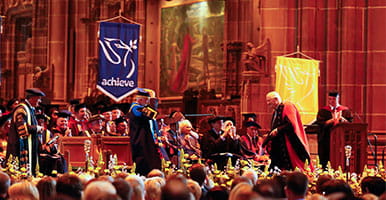Johnny Ball
Presented by Professor Frank Sanderson
Honorable Pro-Chancellor, I have pleasure in presenting Johnny Ball for the award of an Honorary Fellowship of Liverpool John Moores University.
Johnny Ball, 'English God of Numbers', is an inspirational communicator, a broadcasting legend and populariser of science and mathematics with an uncanny ability to make the obscure and complex understandable in an entertaining way.
He can safely be described as the man who has done more for the mathematical awareness of the masses than, as one writer observed, Sir Isaac Newton and his apple. And not surprisingly, he has earned great respect in scientific circles for his efforts - no mean achievement in itself.
Graham Thorben Ball was born in Bristol in 1938. When he was 11, the family moved north to Bolton.
At the time, Bolton Wanderers had a right-back who played in 'The Matthews Final' at Wembley called Johnny Ball. Graham soon acquired the nickname 'Johnny' and it stuck.
From then on, whenever his mother called him 'Graham', he knew he was in trouble.
After leaving school, Johnny spent 3 years in the RAF, but his real ambition was to be an entertainer.
First, he worked as a Butlin's Redcoat and learned how to be a stand-up comic. He became a well-known face via BBC's Play School where he featured for 17 years, but also wrote gags for shows like Crackerjack. He appeared in Val Doonican and Harry Secombe TV Shows, compèred the first Rolling Stones Tour, starred in Sadler's Wells Opera, and wrote Play Away and adult TV comedies before turning to factual information.
His TV shows and videos won 12 awards in as many years, including a New York International Emmy nomination, the ITVA ""Presenter of the Year"" Craft Award and a BAFTA.
He is married to Dianne and has 3 children: Zoe - you may have heard of Zoe - and Nick and Danny. His lasting contribution is through making learning fun for young people.
From 1977 to 1987, he scripted fifteen award-winning Think series for children, including Think Of A Number, Think Again, Think This Way, and Think Backwards.
Although we see less of him on TV these days, he is still enthusiastically making maths and science fun, not least for school and university students. His lectures take many forms with "Funtastic Maths", "Engineering a Brighter Future" and "Past Imperfect - Future Fantastic", each geared at progressively older audiences.
He talks on mathematics at Educational conferences and has performed Maths master classes for Imperial College, University College London, The Royal Institution, Southampton University and Liverpool John Moores University.
He particularly would like to encourage women to pursue science and engineering careers. He says that "Women make such excellent scientists and engineers - because of their passion for learning and will-power to succeed. They out-perform the lads in science all the way through school, but somehow are put off engineering and science at a higher level, and that is so very sad."
He has written several science musicals, including "The Michael Faraday All Electric Roadshow" and "Let the Force be with You!" which both reached over 250,000 schoolchildren on tour, and "Energy Champions" for NORWEB, which drew rave reviews.
Enthusing on prospects for science and technology, he has made numerous addresses to a wide variety of audiences, recently making 40 speeches in a two-week period. And he often represents the Department for Education & Skills on such matters such as Lifelong Learning and Ageism.
His contribution to education has been widely acknowledged:
- He has three honorary doctorates in Science
- He is a Fellow of the Royal Society for the Encouragement of Arts, Manufactures and Commerce
- He was Lord Rector of Glasgow University 1994/6
- He was President of the National Association for Gifted Children 1991/7
- He was appointed as Ambassador for "The Campaign to Promote Engineering"
- He devised the GET SET programme which annually puts 400 girls through 26 projects at Imperial College
- He opened the Science Museum's Launch Pad and hosted its 10th Anniversary
- His pyrotechnical show, "Everything Burns" for Southern Counties Brigades, won the National Fire Prevention "Best Event" award
Johnny Ball has strong and affectionate memories of Liverpool ever since he worked in the city in the 1960s - providing him with memorable and colourful experiences, first as a drummer (he recently took up drumming again after 40 years and is playing better than ever in the style of Buddy Rich), then as a stand-up comedian and even including a spell as a Social Security Officer in the Islington district of Liverpool.
And he has been a Liverpool FC fan ever since he stood on the Kop in 1960, supporting the team, as he says, through 'thick and thicker'. He clearly has a strong claim to be one of us.
Now in his 60s, Johnny is an inspiration to the increasing numbers of people who don't want to stop working when they're 60 or 65. He argues that discrimination due to age is one of the great injustices of modern life and that the desire to work and be useful through work is what makes life worth living for many people.
Thankfully, the legislators are beginning to agree with him.
Johnny once said that "if mathematics is to be understood widely, we need to emphasise its elegance and its applications. Sometimes it seems that universities want to emphasise how difficult it is!"
Liverpool John Moores University is a 21st century university, in tune with the real world, with a determination to be inclusive rather than exclusive and a mission to enlighten rather than mystify our students and clients.
We fully support Johnny Ball's message, and recognise the need to emphasise the elegance, and the world of work applications, not only of mathematics but of each of the subjects we offer. It is entirely fitting therefore that we honour Johnny Ball today.
Thus I have pleasure in presenting Johnny Ball, this most distinguished and inspirational communicator, for admission to our highest honour of Fellow of Liverpool John Moores University.



